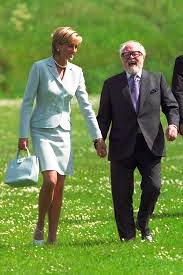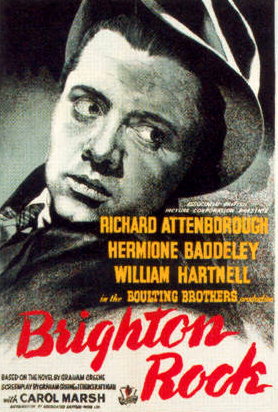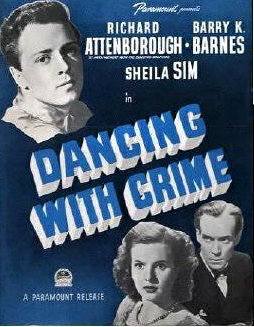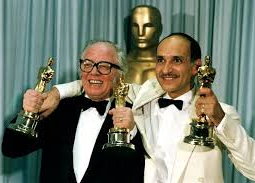|
|
||
|
Pro Tools
FILMFESTIVALS | 24/7 world wide coverageWelcome ! Enjoy the best of both worlds: Film & Festival News, exploring the best of the film festivals community. Launched in 1995, relentlessly connecting films to festivals, documenting and promoting festivals worldwide. Working on an upgrade soon. For collaboration, editorial contributions, or publicity, please send us an email here. User login |
Gandhi director Attenborough leaves a rich legacy
Surviving ten testing years, actor-director-producer Lord Richard Attenborough (Life Peer-1993, CBE-1967, knighted-1976, Padma Bhushan-1983), breathed his last on 24 August 2014, five days short of his 91st birthday. For many in the film fraternity, the face of British cinema has faded out. For millions in India, it is the passing away of the Englishman who immortalised the Father of the Indian Nation, Mohandas Karamchand (Mahatma) Gandhi, on celluloid. His Gandhi (1982), made in English and painstakingly dubbed in Hindi too, remains a classic, both at the box office and at the Oscars, with 8 wins, including Best Film and Best Director. In 2004, his elder daughter Jane Holland, her daughter, Lucy, and her mother-in-law, were killed in the south Asian tsunami. That was one body blow, which he described as the “…worst day of my life.” Then, in August 2008, he had a pacemaker installed. Four months later, he suffered a stroke and had a fall, landing him in coma. Though Sir Richard recovered in a few days, he could only move in a wheelchair and was never the same. Meanwhile his youngest brother John died in 2012. A lot of time was being spent at the nursing home, so the Attenboroughs sold-off their home in Richmond for £11.5 million. On Sunday, son Michael, 64, a theatre director, announced that his father was no more. (Michael’s sister Charlotte, 55, an actress (Jane Eyre, 1996) is married to actor Graham Sinclair).
Seven years before he lost his daughter, he had lost a close friend—Princess Diana. Shortly after the royal marriage, Prince Charles called Lord Richard when he was overseas, to ask him if he would coach Diana in speaking and communication skills. Attenborough readily agreed. The two became friends, and Diana even helped him fund some of his charities. He was deeply pained at her untimely and shocking death, in 1997. That was the first major tragedy in his later years. Born Richard Samuel Attenborough on August 29, 1923 at Cambridge, he was the son of a college administrator, later Principal, of Leicester University College. His mother was the President of Leicester Little Theatre. He had two younger brothers, John (an executive with Alfa Romeo) and David (David is about four years younger). Richard studied at Wyggester Grammar School, Leicester, but left the school aged 16. He had developed a passion for acting and started working on stage at the age of 12. Soon afterwards, he won a scholarship and joined Royal Academy of Dramatic Art (RADA), which is where he met his future wife, Sheila (Beryl Grant) Sim, whom he married in January 1945. The marriage lasted an amazing 69 years, till his death. They worked in a play, The Lady with the Lamp. Later, she even acted in a few films. Making his professional debut at age 18, he played Richard Miller in the play, Ah! Wilderness. Next came the West End debut, in Awake and Sing (1942). That very year, he got a small role in film, Noel Coward’s In Which We Serve (1942). The film was a World War II drama and Richard played a coward sailor who leaves his post. Unfortunately, he got type cast in this image for some time.
Richard joined the Royal Air Force (RAF) in 1943. While on duty, he sustained permanent ear damage. For a while, he was loaned out to the RAF film unit, which was making war effort films like Journey Together. Demobilised in 1946, Richard returned to stage in 1949. He was a member of the original cast of the stage production of Agatha Christie’s The Mousetrap, 1952, which is the longest running play in drama history. Sheila was also in the play. Richard was active on stage till 1965. Meanwhile, his film career had started in earnest and he began getting lead roles. Turning producer in 1959, he formed a partnership with Bryan Forbes (actor-director-screenwriter). Their company was called Beaver Films, and lasted for five years. Actor Richard Attenborough’s directorial debut was Oh What a Lovely War! (1969), a project started by John Mills, who had developed the screenplay, with Len Deighton, from Joan Littlewood's stage play. This satire-fantasy on the First World War is largely set on Brighton Pier, but Attenborough and cinematographer Gerry Turpin successfully move out of the locale and the film is best remembered being the final shot, which pulls back to reveal an entire hillside covered in white crosses, marking graves. Gandhi (1982) got him the Academy Awards for Best Film and Best Director + 6 more. It was a 20-year obsession, since that winter day in 1962 when he sat down in St. Moritz to read Louis Fischer's biography of Gandhi, and he even wrote a book about it, called In Search of Gandhi (1982). Though he continues to make films till 2012, his later films could not match the genius or the popularity of his earlier work.
Often described as a workaholic, he believed passionately in social justice and the Labour Party, and was a vocal campaigner against apartheid. His leisure interests were football, collecting paintings and sculpture, listening to music. Among the numerous positions he held were: Goodwill Ambassador for UNICEF, since 1987, Chairman RADA, VP British Academy of Film and Television Art, VP British Film School, Chairman of the Actors’ Charitable Trust, pro Chancellor of Sussex University, Life President Chelsea Football Club, Trustee, Tate Gallery, Chairman Goldcrest Film and TV (which had partly financed Gandhi), Chairman, Capital Radio, Deputy Chairman, Channel 4 TV.
Selected filmography: 74 films as actor 1947: Brighton Rock. Based on a Graham Greene story, Attenborough's breakthrough role as a psychopathic young razor wielding gangster 1956: Private's Progress. Successful comedy for the Boulting Brothers, John and Roy. 1959: I'm All Right Jack. Another hit comedy for the Boultings 1960: The Angry Silence. He starred as a factory worker who refused to join a strike 1963: The Great Escape. His first role in a major Hollywood, all star cast blockbuster
1963: Séance on a Wet Afternoon. Personal favourite 1964: Guns at Batasi. Bafta Best Actor Award 1965: The Flight of the Phoenix. He acted opposite James Stewart
1967: The Sand Pebbles. Best Supporting Actor, Golden Globe 1968: Doctor Dolittle. With Rex Harrison. Another Best Supporting Actor, Golden Globe 1969: Oh! What a Lovely War. Feature film directorial debut 1971: 10 Rillington Place. Played serial killer John Christie
1972: Young Winston. He directed this epic period film based on British Prime Minister Winston Churchill's early life 1974: And Then There Were None. Based on the Agatha Christie classic, Ten Little Indians 1974: Conduct Unbecoming. With Michael York, Stacy Keach, Trevor Howard, Christopher Plummer, Susannah York
1977: A Bridge Too Far. Directed this epic war film, starring James Caan, Anthony Hopkins and many more. 1977: The Chess Players (Shatranj Ke Khilari), directed by Satyajit Ray 1979: The Human Factor. ‘Every man in love is a potential traitor.’
1982: Gandhi. Won best Picture and Best Director Oscars, and Best Director, Golden Globe
1987: Cry Freedom. About apartheid in South Africa 1992: Chaplin. Attenborough directed and produced this film, starring Robert Downey Jr. Some critics feel it his most under-rated film. 1993: Shadowlands. Another director/producer title for Lord Attenborough, starring Anthony Hopkins. He rates it as his best. 1993: Jurassic Park. Attenborough as John Hammond in the Steven Spielberg film
1994: Miracle on 34th Street. He starred in the remake of this 1947 film 1997: The Lost World: Jurassic Park. Jurassic Park sequel 1998: Elizabeth. Directed by Shekhar Kapur 1998: Grey Owl. Released directly on video in the US 2002: Puckoon. He played the writer/director/creator) 2004: Tres en el camino (Within the Way Without) Introduction (Voice only)
2007: Closing the Ring. A love story set in Belfast, this was his last film as director and producer. It starred Shirley MacLaine and Christopher Plummer, with Neve Campbell and Mischa Barton. Attenborough on Gandhi ''Of course it's a cheek, it's an impudence to tell 50, 60, 70 years of history in three hours. And the temptations of filming in India are simply dreadful. The only kind of epics that work are intimate epics. This film is old-fashioned in its shooting. It is a narrative film. I have no interest in being remembered as a great creative film-maker. I want to be remembered as a storyteller. I realise that in making a film like this, the mere fact of selection carries with it the danger of lack of objectivity. And that objectivity is further reduced by the exclusion of characters and events. There will no doubt be criticism in India - legitimate criticism - that I have left out a number of huge figures in the Indian history of the time. Nehru was closer to Gandhi than anyone else. Nehru willingly said to me: 'Look, he had all the frailties, all the shortcomings. Give us that. That's the measure, the greatness of the man.' '' When the film was finished, we took two hours of it and showed it to all the major distributors in Los Angeles. Every single company that had turned it down over the 20 years bid for it. One of the things that was of great concern to me was that none of the money subscribed by the Indian Government to the fund for indigenous productions would be eroded through our movie. I was given absolute assurances by the (Indian) Minister of Information and Broadcasting that there would be no question of this. Indeed, he went further, to say that whatever profit accrued as the result of the Indian Government's investment, once that investment was repaid, would go to indigenous film production. Nonetheless, there was massive protest, considerable protest, in India that this enormous sum of money had gone to an external movie made by a foreigner about the father of the nation.” Attenborough quotes 1. I am anything but an intellectual. 2. I am an actor. I work on instinct. I work on emotion. 3. It is the narrative filmmakers who I most enjoy. D.W. Griffith is among those who influenced me most. I don't think I have ever been disappointed with a Fred Zinnemann picture. 4. I do care about style. I do care, but I only care about style that serves the subject. 5. I don't read a great deal of fiction, to my shame, other than the classics. 6. And I believe we need heroes, I believe we need certain people who we can measure our own shortcomings by. 7. And whereas I don't suggest for one second that Hemingway falls into the bracket of a heroic figure, he is nevertheless a very grandiose, a very flamboyant, a very theatrically evident figure, who unquestionably changed our views in relation to literature. 8. A number of people have asked me and said, “What performance do you like best or what's the best film you've made?” and so on, and I don't really have any hesitation that the film I'm least embarrassed by and ashamed of or uneasy about is Shadowlands. 9. I'm a passionate trade unionist. 10. I am passionately opposed to capital punishment, and I have been all my life. 11. I just love biography, and I'm fascinated by people who have shifted our destinies or our points of view. 12. I prefer fact to fiction. 13. I understand how to cast and I understand how to get performances out of actors. 14. I can't write, I can't paint, I don't compose. 15. They criticise films that they think you ought to have made, not the film that you wanted to make and did make. 16. I work as an actor work-- to involve an audience by engaging their emotions, to interest them in the story you are putting before them.
Gleanings from Entirely Up To You, Darling by Richard Attenborough and Diana Hawkins (Hawkins has worked with Attenborough on all the films he has directed, as co-Producer, Producer, etc.). It was Sheila’s idea that Lord Richard should collaborate with Diana on his autobiography. *He loathes being called Dickie. *A young Madonna auditioned for a part as an extra in A Chorus Line. *The Hinduja brothers pledged funding for Gandhi, then refused to sign the final contract. *Robert Downey Jr, star of Chaplin, invited Attenborough and Hawkins to dinner and seated them opposite a tailor's dummy dressed as the Little Tramp. *Desperate to get finance, he once piled his art collection into the boot of his Rolls-Royce, parked it outside the Bank of Scotland, and offered to leave the paintings in exchange for an extended overdraft. *He once forced his brother David, as a youth, to dress up in drag, and perform in a skit called Lydies Wot Come to Oblige. *Lord Richard nursed one last ambition---He planned to make one last film, a film on the life of his hero, Thomas Paine. 25.08.2014 | Siraj Syed's blog Cat. : Chaplin gandhi Oh! What a Lovely War Princess Diana Richard Attenborough Shadowland The Great Escape PEOPLE
|
LinksThe Bulletin Board > The Bulletin Board Blog Following News Interview with IFTA Chairman (AFM)
Interview with Cannes Marche du Film Director
Filmfestivals.com dailies live coverage from > Live from India
Useful links for the indies: > Big files transfer
+ SUBSCRIBE to the weekly Newsletter Deals+ Special offers and discounts from filmfestivals.com Selected fun offers
> Bonus Casino
User imagesAbout Siraj Syed Syed Siraj Syed Siraj (Siraj Associates) Siraj Syed is a film-critic since 1970 and a Former President of the Freelance Film Journalists' Combine of India.He is the India Correspondent of FilmFestivals.com and a member of FIPRESCI, the international Federation of Film Critics, Munich, GermanySiraj Syed has contributed over 1,015 articles on cinema, international film festivals, conventions, exhibitions, etc., most recently, at IFFI (Goa), MIFF (Mumbai), MFF/MAMI (Mumbai) and CommunicAsia (Singapore). He often edits film festival daily bulletins.He is also an actor and a dubbing artiste. Further, he has been teaching media, acting and dubbing at over 30 institutes in India and Singapore, since 1984.View my profile Send me a message The EditorUser contributions |

















 Gandhi director Richard Attenborough leaves a rich legacy
Gandhi director Richard Attenborough leaves a rich legacy























